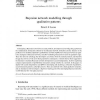Free Online Productivity Tools
i2Speak
i2Symbol
i2OCR
iTex2Img
iWeb2Print
iWeb2Shot
i2Type
iPdf2Split
iPdf2Merge
i2Bopomofo
i2Arabic
i2Style
i2Image
i2PDF
iLatex2Rtf
Sci2ools
110
click to vote
AI
2005
Springer
2005
Springer
Bayesian network modelling through qualitative patterns
In designing a Bayesian network for an actual problem, developers need to bridge the gap between ematical abstractions offered by the Bayesian-network formalism and the features of the problem to be modelled. Qualitative probabilistic networks (QPNs) have been put forward as qualitative analogues to Bayesian networks, and allow modelling interactions in terms of qualitative signs. s have the advantage that developers can abstract from the numerical detail, and therefore the gap may not be as wide as for their quantitative counterparts. A notion that has been suggested in the literature to facilitate Bayesian-network development is causal independence. It allows exploiting compact representations of probabilistic interactions among variables in a network. In the paper, we deploy both causal independence and QPNs in developing and analysing a collection of qualitative, causal interaction patterns, called QC patterns. These are endowed with a fixed qualitative semantics, and are intended...
AI 2005 | Artificial Intelligence | Bayesian Networks | Causal Independence | Qualitative Probabilistic Networks |
Related Content
| Added | 15 Dec 2010 |
| Updated | 15 Dec 2010 |
| Type | Journal |
| Year | 2005 |
| Where | AI |
| Authors | Peter J. F. Lucas |
Comments (0)

